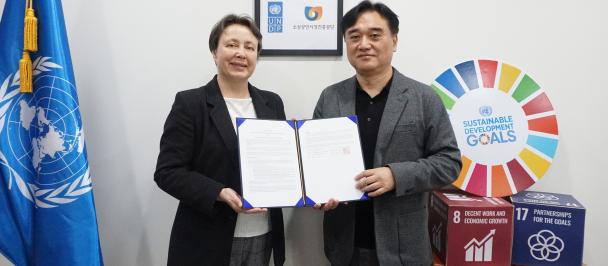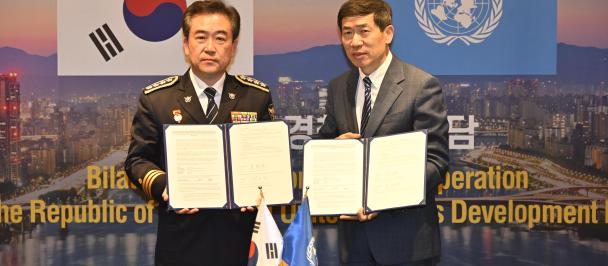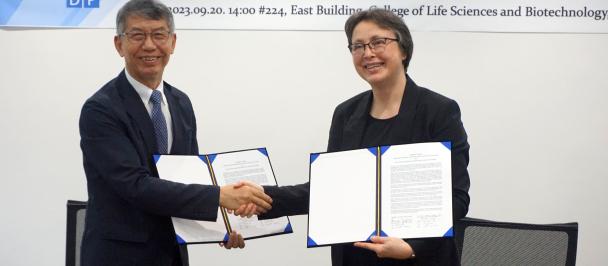UNDP launches 2023/24 Human Development Report in the Republic of Korea, revealing urgent need for global cooperation to combat inequality and polarization
May 23, 2024
Video: Korea University Media Center
Replay the live stream of this event: English Korean
23 May 2024, Seoul – Uneven development progress is leaving the poorest behind, exacerbating inequality and stoking political polarization on a global scale. The result is a dangerous gridlock that must be urgently tackled through collective action, according to a new report launched in the Republic of Korea today by the United Nations Development Programme (UNDP).
The 2023/24 Human Development Report, titled “Breaking the Gridlock: Reimagining cooperation in a polarized world”, was launched at Lotte Hotel Seoul on 23 May by UNDP Seoul Policy Centre in partnership with the Ministry of Foreign Affairs of the Republic of Korea, Korea University, and UNDP’s Human Development Report Office, following the global release of the report on 13 March this year.
The report reveals a troubling trend: the rebound in the global Human Development Index (HDI) – a summary measure reflecting a country’s Gross National Income (GNI) per capita, education, and life expectancy – has been partial, incomplete, and unequal. The HDI is projected to reach record highs in 2023 after steep declines during 2020 and 2021. But this progress is deeply uneven with rich countries experiencing record-high levels of human development while half of the world’s poorest countries remain below their pre-crisis level of progress. The widening human development gap revealed by the report shows that the two-decade trend of steadily reducing inequalities between wealthy and poor nations is now in reverse.
The report further argues that advancing international collective action on shared challenges such as poverty and inequality, climate change or digitalization is hindered by an emerging ‘democracy paradox’: while 9 in 10 people worldwide endorse democracy, over half of global survey respondents express support for leaders that may undermine it by bypassing fundamental rules of the democratic process, as per data analysed in the report. Half of people surveyed worldwide report having no or limited control over their lives, and over two-thirds believe they have little influence on their government’s decisions.
“Political polarization is also a growing concern with global repercussions. Along with a sense of powerlessness, it is fuelling inward-turning policy approaches – starkly at odds with the global cooperation needed to address urgent issues like the decarbonization of our economies, misuse of digital technologies, and conflict. This is particularly alarming in light of 2023's record-breaking temperatures, which emphasize the immediate need for united action to tackle the climate crisis, or in the advent of artificial intelligence as a new and fast-evolving technological frontier with little or no regulatory guard rails,” said Pedro Conceição, Director of UNDP’s Human Development Report Office and lead author of the report.
Bridging agency gaps, mitigating polarization, and establishing innovative frameworks for global public goods to break the gridlock and reimagine cooperation for human development
To break the global gridlock and scale up collective action, the report suggests narrowing agency gaps in development to give people the ability to determine their own future, dialing down polarization and mistrust, and building a new architecture for global public goods to complement the two existing tracks of international cooperation – humanitarian assistance and development assistance.
“The 2023/24 Human Development Report provides insightful strategies to address the crises we face, including uneven development, growing inequalities, and escalating political polarization. It highlights crucial elements for human development such as agency and international cooperation, which are also reflected in Korea’s own development journey. As a member of the Security Council for 2024-25, Korea is committed to making active contributions to the international community,” said Ki-hwan Kweon, Deputy Minister for Multilateral and Global Affairs, Ministry of Foreign Affairs of the Republic of Korea.
The launch event featured an interactive panel discussion building on the report’s key messages on breaking the global gridlock and scaling up collective action. Jiyeon Janice Ryu, Resident Representative of the International Finance Corporation (IFC) Korea Office, Don Min Lee, Director of Center for Strategic Planning at the National Institute of Green Technology (NIGT), Jaesung Kwak, Vice President of the Korea Association of International Development and Cooperation (KAIDEC), and Leo Dhohoon Kim, CEO at Ars Praxia provided insights from diverse perspectives on reshaping global finance, achieving climate stability, promoting international cooperation and multilateralism, and dialing down polarization by addressing the agency gap and tackling misperceptions.
“The latest Human Development Report reaffirms its status as a pillar of international development discourse, offering valuable insights for addressing current challenges and recommendations that propel the global dialogue on shaping future development strategies,” remarked Anne Juepner, Director of UNDP Seoul Policy Centre.
The launch event witnessed active engagement of participants from government, embassies, international organizations, think-tanks and research institutes, private sector, civil society organizations, academia and youth groups who joined both offline and online via live stream.
Presentations
| Session | Title | Speaker |
|---|---|---|
| Introduction of Human Development Report 2023/24 | Breaking the gridlock: Reimagining cooperation in a polarized world | Pedro Conceição | Director of UNDP Human Development Report Office and Lead Author of Human Development Report |
| Reshaping global finance | Partnering with IFC | Jiyeon Janice Ryu | Resident Representative, International Finance Corporation (IFC) Korea Office |
| Achieving climate stability | Reframing planetary challenges through a global public goods | Don Min Lee | Director of Center for Strategic Planning, National Institute of Green Technology (NIGT) |
| Promoting international cooperation and multilateralism | Case Presentation: Establishment of e-Mobility Ecosystem for Carbon reduction in Cambodia | Jaesung Kwak | Vice President, Korea Association of International Development and Cooperation (KAIDEC) |
| Dialing down polarization by addressing the agency gap and tackling misperceptions | What is the core problem & how can we tackle it? | Leo Dhohoon Kim | CEO at Ars Praxia |
Published since 1990, the Human Development Report (available at https://hdr.undp.org/) is an independent publication commissioned by the United Nations Development Programme to assess trends, raise awareness about human development around the world and prompt policy dialogue to promote sustainable human development.
To view the full report, visit https://hdr.undp.org/human-development-report-2023-24
About UNDP: UNDP is the leading United Nations organization fighting to end the injustice of poverty, inequality, and climate change. Working with our broad network of experts and partners in 170 countries, we help nations to build integrated, lasting solutions for people and planet. Learn more at undp.org or follow at @UNDP.
About UNDP Seoul Policy Centre: UNDP Seoul Policy Centre is a facilitator of innovative development cooperation to catalyse the achievement of the Sustainable Development Goals. Through its SDG Partnerships programme and other South-South and Triangular Cooperation initiatives, the Centre supports countries by sharing innovative, tested-and-proven practices and policy tools on strategic development issues globally. Learn more at undp.org/policy-centre/seoul or follow at @UNDPSPC.
Annex: Korea's Human Development Index (HDI)

Source: Human Development Reports – Korea (Republic of)
Korea's HDI value for 2022 is 0.929 – which put the country in the Very High human development category – positioning it at 19 out of 193 countries and territories and maintaining its ranking from the year before despite the increase in the total number of countries and territories compared. Between 1990 and 2022, Korea's HDI value changed from 0.731 to 0.929, a change of 27.1 percent.
| Category | 2021 Korea | 2022 Korea | 2022 OECD Average | 2022 World |
|---|---|---|---|---|
| HDI Rank | 20 | 19 | - | - |
| Human Development Index (HDI) | 0.926 | 0.929 | 0.906 | 0.739 |
| Gender Development Index (GDI) | 0.944 | 0.948 | 0.984 | 0.951 |
| Gender Inequality Index (GII) | 0.067 | 0.062 | 0.194 | 0.462 |
| Inequality-adjusted Human Development Index (IHDI) | 0.838 | 0.841 | 0.803 | 0.576 |
| Planetary pressures-adjusted Human Development Index (PHDI) | 0.752 | 0.775 | 0.787 | 0.685 |

 Locations
Locations


